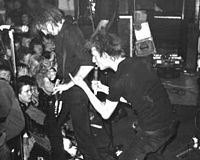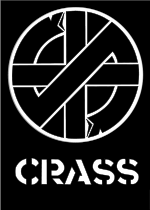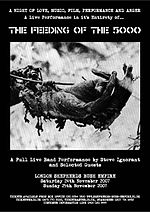- Crass
-
This article is about the British rock band. For the definition of "crass", see crass.
Crass 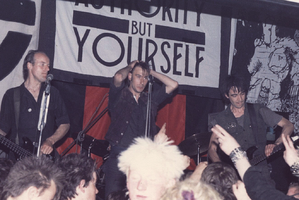
Crass, May 1984.Background information Origin Epping, Essex, England, UK Genres Anarcho-punk, punk rock, post-punk, art punk, noise rock, free improvisation Years active 1977–1984 Labels Small Wonder Records, Crass Records Past members Penny Rimbaud
Gee Vaucher
Steve Ignorant
N. A. Palmer
Phil Free
Pete Wright
Eve Libertine
Joy De Vivre
Mick Duffield
John Loder
Steve HermanCrass are an English punk rock band that was formed in 1977,[1][2] which promoted anarchism as a political ideology, way of living, and as a resistance movement. Crass popularised the seminal anarcho-punk movement of the punk subculture, and advocated direct action, animal rights, and environmentalism. The band both utilised and advocated a DIY punk ethic approach, producing sound collages, graphics, albums, and films. Crass also criticised mainstream culture and attempted to subvert it with messages promoting feminism, anti-racism, anti-war, and anti-globalisation.
Crass practiced "direct action" by spray-painting stencilled graffiti messages around the London Underground system and on advertising billboards, coordinating squats, and organising political action. The band also expressed its ideals by dressing in black, military surplus-style clothing, and using a stage backdrop which amalgamated several "icons of authority" including the Christian Cross, the swastika, the Union Flag, and an Ouroboros.
The band were critical of punk subculture itself, as well as wider youth culture in general. Crass promoted the type of anarcho-pacifism that eventually became more common in the punk music scene (see anarcho-punk[3]). They are also considered involved with the art punk genre,[4] due to their use of tape collages, graphics, spoken word releases, poetry and improvisation.
History
Origins
The band was based around Dial House, an open house community near Epping, Essex, when Dial House founder and former member of avant-garde performance art groups EXIT and Ceres Confusion Penny Rimbaud (real name Jeremy Ratter) began performing with Clash fan Steve Ignorant (real name Steve Williams), who was residing in the house at the time. Between them, they produced the songs "So What?" and "Do They Owe Us A Living?" as a drums and vocals duo. For a short period of time, they called themselves Stormtrooper, before choosing the name Crass, a reference to the David Bowie song "Ziggy Stardust," specifically the line "The kids was just crass."[5]
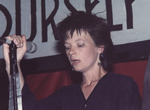 Crass singer Eve Libertine, May 1984
Crass singer Eve Libertine, May 1984
Other friends and members of the household joined, including Joy De Vivre, Pete Wright, N. A. Palmer (real name Andy Palmer), Steve Herman and Eve Libertine (real name Bronwyn Lloyd Jones), who was considered "the band's first fan,"[6] and it was not long before Crass performed their first live gig at a squatted street festival at Huntley Street, North London. Here they had intended to play a set of five songs; however, the "plug was pulled" on them by a neighbour after three songs.[7] Guitarist Steve Herman soon afterwards left the band to be replaced by Phil Free (real name Phil Clancey).[8] Other early Crass gigs included a four date tour of New York City,[9] a gig at a festival in Covent Garden at which Charles Hayward of This Heat stood in for Rimbaud on drums,[10] as well as playing alongside the UK Subs at the White Lion pub in Putney. These latter performances were often not well-attended; "The audience consisted mostly of us when the Subs played and the Subs when we played."[11]
Crass also played two gigs at the Roxy Club in Covent Garden, London.[10] According to Rimbaud, all the band members arrived drunk at the second gig, and were ejected from the stage. This event was immortalised by their song "Banned from the Roxy"[12] and the essay Crass at the Roxy by Penny Rimbaud.[13]
Following this incident, the band decided to take themselves more seriously, particularly paying more attention to their presentation. As well as avoiding alcohol or cannabis before gigs, they also adopted a policy of wearing black, military surplus-style clothing at all times, whether on or off stage. They introduced their distinctive stage backdrop, a logo designed by Rimbaud's friend Dave King of Sleeping Dogs Lie. This gave the band a militaristic image, which led some to accuse them of fascism. Crass countered that their uniform appearance was intended to be a statement against the "cult of personality", so that, in contrast to the norm for many rock bands, no member would be identified as the 'leader'.[14]
Originally conceived and intended as the cover artwork for a self-published pamphlet version of Christ's Reality Asylum by Penny Rimbaud, the Crass logo represented an amalgamation of several "icons of authority," including the Christian Cross, the swastika, and the Union Flag, combined with a two-headed Ouroboros to symbolise the idea that power will eventually destroy itself.[15][16] Using such deliberately mixed messages was part of Crass' strategy of presenting themselves as a "barrage of contradictions", which also included using loud, aggressive music to promote a pacifist message, and was in part a reference to their own Dadaist and performance art backgrounds.
The band eschewed any elaborate stage lighting during live sets, instead preferring to be illuminated by simple 40 watt household light bulbs (the technical difficulties of filming under such lighting conditions in part explains why there is so little live footage of Crass in existence[17]). The band pioneered multimedia presentation techniques, fully utilising video technology and using back-projected films and video collages made by Mick Duffield and Gee Vaucher to enhance their performances.
The Feeding of the 5000 and Crass Records
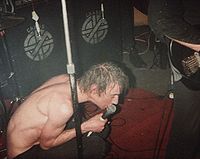 Crass singer Steve Ignorant, June 1981
Crass singer Steve Ignorant, June 1981 Main article: Crass Records
Main article: Crass RecordsCrass' first release was The Feeding Of The 5000, an 18 track 12" 45 rpm EP on the Small Wonder label in 1978. Workers at the pressing plant initially refused to handle it due to the allegedly blasphemous content of the song "Asylum". The record was eventually released with this track removed and replaced by two minutes of silence, ironically titled "The Sound Of Free Speech". This incident prompted Crass to set up their own independent record label, Crass Records, in order to prevent Small Wonder from being placed in a compromising position in the future [18] as well as retain full editorial control over their material. "Asylum", now renamed "Reality Asylum", was shortly afterwards released on Crass Records in a re-recorded and extended form as a 7" single. Later pressings of the album (also on Crass Records) restored the original version of the missing track.
As well as their own material, Crass Records released recordings by other performers, the first of which was the 1980 single "You Can Be You" by Honey Bane, a teenage girl who was staying at Dial House whilst on the run from a children's home. Other artists included Zounds, Flux Of Pink Indians, Omega Tribe, Rudimentary Peni, Conflict, Icelandic band KUKL (who included singer Björk), classical singer Jane Gregory, Anthrax, Captain Sensible, Lack of Knowledge and the Poison Girls, a like-minded band who worked closely with Crass for several years.
Crass Records also put out three editions of Bullshit Detector, compilations of demos and rough recordings which had been sent to the band, and which they felt represented the DIY punk ethic. The catalogue numbers of Crass Records releases were intended to represent a countdown to the year 1984 (eg, 521984 meaning "five years until 1984"), both the year that Crass stated that they would split up, and a date charged with significance in the anti-authoritarian calendar due to George Orwell's novel of the same name.
Penis Envy
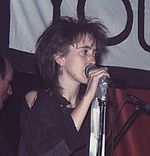 Crass singer Joy De Vivre, 1984
Crass singer Joy De Vivre, 1984
Crass released their third album Penis Envy in 1981. This marked a departure from the 'hardcore punk' image that The Feeding of the 5000 and its follow up Stations of the Crass had to some extent given the group. It featured more complex musical arrangements and exclusively female vocals provided by Eve Libertine and Joy De Vivre (although Steve Ignorant remained a group member and is credited on the record sleeve as "not on this recording").
The album addressed feminist issues and once again attacked the institutions of 'the system' such as marriage and sexual repression. The last track on Penis Envy, a deliberately saccharine parody of a 'MOR' love song entitled "Our Wedding", was also made available as a white flexi disc to the readers of 'Loving', a teenage girl's romance magazine. The free flexi offer had been suggested to Loving by an organisation calling itself "Creative Recording And Sound Services" (note the initials). A minor tabloid controversy resulted once the hoax was revealed, with the News of the World going so far as to state that the title of the flexi's originating album was "too obscene to print".[19] The album was banned by retailers HMV. During the mid 1980s, under the direction of James Anderton copies were seized, along with other records by Crass and The Dead Kennedys, by Greater Manchester Police from Eastern Bloc record shop. Frank Schofield was charged with displaying "Obscene Articles For Publication For Gain". The band, Flux of Pink Indians its two record labels and its publishing company were also charged under the Obscene Publications Act, but all charges were dropped by Greater Manchester Police.[20]
Christ - The Album and a change of strategy
The band's fourth LP, 1982's double set Christ - The Album, took over a year to record, produce and mix, during which time the Falklands War had broken out and ended. This caused Crass to fundamentally question their approach to making records. As a group whose primary purpose was political commentary, they felt they had been overtaken and made to appear redundant by real world events. Subsequent releases, including the singles "How Does It Feel to Be the Mother of a Thousand Dead" and "Sheep Farming in the Falklands", and the album Yes Sir, I Will, saw the band strip their sound back to basics and were issued as "tactical responses" to political situations.[21] They also anonymously produced 20,000 copies of a flexi-disc featuring a live recording of "Sheep Farming...", copies of which were randomly inserted into the sleeves of other records by sympathetic workers at the Rough Trade records distribution warehouse as a means of spreading their views to those who might not normally hear them.[22]
Direct Action and internal debates
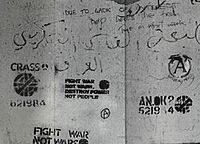 Detail from front cover artwork from Stations of the Crass, illustrating an example of the stenciled graffiti used by the band
Detail from front cover artwork from Stations of the Crass, illustrating an example of the stenciled graffiti used by the band
From their earliest days of spraying stencilled anti-war, anarchist, feminist and anti-consumerist graffiti messages around the London Underground system and on advertising billboards,[23][24] the band had always been involved in political as well as musical activities. On December 18, 1982, Crass co-ordinated a 24 hour squat of the Zig Zag club in West London primarily for an all day event attended by approximately 500 people to prove "that the underground punk scene could handle itself responsibly when it had to and that music really could be enjoyed free of the restraints imposed upon it by corporate industry".[25]
Bands playing at the Zig Zag (in running order) were Faction, D and V, Omega Tribe, Lack of Knowledge, Sleeping Dogs, The Apostles, Amebix, Null & Void, Soldiers of Fortune, The Mob, Polemic Attack, Poison Girls, Conflict, Flux of Pink Indians, Crass and DIRT.[26]
In 1983 and 1984 they were part of the Stop the City actions instigated by London Greenpeace[27] that were arguably fore-runners of the anti-globalisation actions of the early 21st century.[28] Explicit support for such activities was given in the lyrics of the band's final single release "You're Already Dead", which also saw Crass publicly express growing doubts regarding their longtime commitment to pacifism. This led to further introspection within the band, with some members feeling that they were beginning to become embittered as well as losing sight of their essentially positive stance.[29] As a reflection of this debate, the next release using the Crass name was Acts of Love, classical music settings of 50 poems by Penny Rimbaud described as "songs to my other self" and intended to celebrate "'the profound sense of unity, peace and love that exists within that other self."[30]
Thatchergate
A further post-Falklands war hoax that originated from members of Crass became known as 'the Thatchergate tapes'.
This was a cassette featuring what appeared to be an accidentally overheard telephone conversation, due to crossed lines. In reality the tape had been constructed by Crass, using edited recordings of Margaret Thatcher and Ronald Reagans' voices. On the Thatchergate tape they discuss the sinking of the HMS Sheffield during the Falklands War, and appeared to allege that Europe would be used as a target for nuclear weapons in any conflict between the United States and the Soviet Union.
Copies were leaked to the press, and the US State Department believed the tape to be propaganda produced by the Soviet KGB, a story reported by both the San Francisco Chronicle[31] and The Sunday Times.[32] Although put together totally anonymously, the British Observer newspaper was somehow able to link the tape with the band.[33]
Dissolution
Crass all but retired from the public eye after becoming a small thorn in the side of Margaret Thatcher's government following the Falklands War. Questions in Parliament and an attempted prosecution under the UK's Obscene Publications Act for their single "How Does It Feel..."[34] led to a round of court battles and what the band describes as harassment that finally took its toll. On July 7, 1984 the band played their final gig at Aberdare in Wales, a benefit for striking miners, before retreating to Dial House to concentrate their energies elsewhere.
Guitarist N. A. Palmer had announced that he intended to leave the band in order to further his art college studies, and the reported group consensus was that replacing him would be "like having a corpse in the band".[citation needed] This catalysed the affirmation of Crass' consistently stated intention to split up in 1984. Steve Ignorant went on to join the band Conflict, with whom he had already worked on an ad hoc basis, and in 1992 formed Schwartzeneggar (sic). From 1997-2000, he was a member of the group Stratford Mercenaries. He has also worked as a Punch and Judy professor and as a solo performer. Eve Libertine continued to record with her son Nemo Jones as well as performance artist A-Soma. Pete Wright concentrated on building himself a houseboat and formed the performance art group Judas 2, whilst Rimbaud continued to write and perform both solo and with other artists.
2002 onwards: The Crass Collective/Crass Agenda/Last Amendment
In November 2002 several former members of Crass collaborated under the name The Crass Collective to arrange Your Country Needs You, a concert of "voices in opposition to war" held at the Queen Elizabeth Hall on London's South Bank that included a performance of Britten's War Requiem as well as performers such as Goldblade, Fun-Da-Mental, Ian MacKaye and Pete Wright's post-Crass project Judas 2. In October 2003, the Crass Collective changed their working title to Crass Agenda. During 2004 Crass Agenda were at the forefront of the campaign to save the Vortex Jazz Club in Stoke Newington, North London, which has now relocated to Dalston. In June 2005 Crass Agenda was declared to be 'no more', subsequently changing the name of the project to the 'more appropriate' Last Amendment. A "new" Crass track (actually a remix of 1982's "Major General Despair", with new lyrics), "The Unelected President", is also available.[35]
2007: The Feeding of the 5000 (revisited)
On 24 and 25 November 2007 Steve Ignorant performed Crass' entire Feeding of the 5000 album live at the Shepherds Bush Empire, United Kingdom, backed by a band of "selected guests".[36][37] Other members of Crass were not involved in these concerts. Rimbaud initially refused Ignorant the right to perform Crass songs Rimbaud had written, but later changed his mind. "I acknowledge and respect Steve's right to do this", he said, "but I do regard it as a betrayal of the Crass ethos"[38] Ignorant had a different view: "I don't have to justify what I do. (...) Plus, most of the lyrics are still relevant today. And remember that three-letter word, 'fun'?"[38]
2010: The Crassical Collection reissues
In August 2010, it was announced that Crass were going to release The Crassical Collection, consisting of remastered reissues of their back catalogue. The first in this series is a newly remastered edition of The Feeding of the 5000, restored from the original analogue studio tapes, repackaged and bolstered by rare and unreleased tracks and new artwork from Gee Vaucher. Stations of the Crass was released in October 2010, with new editions of Penis Envy, Christ – The Album, Yes Sir, I Will and Ten Notes on a Summer's Day being issued during 2011.[39]
Influences
Crass influenced the anarchist movement in the UK, US, and around the world. With the growth of anarcho-punk came new generations of people who became interested in anarchist ideas.
The philosophical and aesthetic influence of Crass on numerous punk bands from the 1980s were far reaching, even if few bands mimicked their later more free-form musical style (as on Yes Sir, I Will and their final recording, 10 Notes on a Summer's Day).
The band has stated that their musical antecedents and influences were seldom drawn from the rock music tradition, but rather from classical music (particularly Benjamin Britten, on whose work, Rimbaud states, some of Crass' riffs are directly based[40]), Dada and the avant-garde such as John Cage as well as performance art traditions.
Their painted and collage-art black-and-white record sleeves produced by Gee Vaucher themselves became a signature aesthetic model, and can be seen as an influence on later artists such as Banksy (Banksy and Vaucher have latterly collaborated[41]) and the subvertising movement.
Anti-folk artist Jeffrey Lewis's 2007 album 12 Crass Songs features acoustic covers of material originally written by Crass.
In February 2011, the artist Toby Mott showed a small part of his personal collection of Crass ephemera at the Roth gallery, New York.[42][43] The exhibition featured artwork, albums, including original 12” LPs and EPs, 7” singles from Crass Records, and a complete set of Crass’ iconic house zine, Inter-National Anthem. The material featured in the exhibition spans the high period of Crass’ endeavours, from 1978 to 1984, and constitutes a special segment of The Mott Collection.
Members
- Steve Ignorant (Voice)
- Eve Libertine (Voice)
- Joy De Vivre (Voice)
- N. A. Palmer (Guitar)
- Phil Free (Guitar)
- Pete Wright (Bass and Voice)
- Penny Rimbaud (Drums, Voice)
- Gee Vaucher (Artwork, Piano, Radio)
- Mick Duffield (Films)
- John Loder, sound engineer and founder of Southern Studios, is sometimes considered to be the '9th member' of Crass[44]
- Steve Herman left Crass shortly after their first gig.
Discography
(All released on Crass Records unless otherwise stated.)
LPs
- The Feeding of the 5000 (LP, 1978, Small Wonder Records) [UK Indie -#1]
- The Feeding of the 5000 - Second Sitting (LP, 1980, Reissue on Crass Records 621984, with the missing track "Asylum" reinstated) (UK Indie – #11)
- Stations Of The Crass (521984, double LP, 1979) (UK Indie – #1)
- Penis Envy (321984/1, LP, 1981) (UK Indie – #1)
- Christ - The Album (BOLLOX2U2, double LP, 1982) (UK Indie – #1)
- Yes Sir, I Will (121984/2, LP, 1983) (UK Indie – #1)
- Ten Notes on a Summer's Day (Cat No. 6, LP, 1985, Crass Records. Poems written by Penny Rimbaud and set to a slow rock song, sung by Eve Libertine and Steve Ignorant.)
- Acts Of Love (1984/4, LP and book, 1985. Poems of Penny Rimbaud set to classical music, sung by Eve Libertine and Steve Ignorant. The book is illustrated with paintings by Gee Vaucher)
- Best Before 1984 (CATNO5, double LP compilation, 1986) (UK Indie – #7)
- The Crassical Collection; The Feeding of the 5000 (CC01CD remastered edition of The Feeding of the 5000, 2010)
- The Crassical Collection; Stations of the Crass (CC02CD remastered edition of Stations of the Crass, 2010)
- The Crassical Collection; Penis Envy (CC03CD remastered edition of Penis Envy], 2010)
EPs
- "Ten Notes On A Summer's Day" (CATNO6, 12" EP, 1986) (UK Indie – #6)
Singles
- "Reality Asylum" / "Shaved Women" (CRASS1, 7", 1979) (UK Indie – #9)
- "You Can Be You" (521984/1, 7" single by Honey Bane, backed by Crass under the name Donna and the Kebabs, 1979) (UK Indie – #3)
- "Bloody Revolutions" / "Persons Unknown" (421984/1, 7" single, joint released with the Poison Girls, 1980) (UK Indie – #1)
- "Tribal Rival Rebel Revels" (421984/6F, flexi disc single given away with Toxic Grafity (sic) fanzine, 1980)
- "Nagasaki Nightmare" / "Big A Little A" (421984/5, 7" single, 1981) (UK Indie – #1)
- "Our Wedding" (321984/1F, flexi disc single by Creative Recording And Sound Services made available to readers of teenage magazine Loving)[45])
- "Merry Crassmas" (CT1, 7" single, 1981, Crass' stab at the Christmas novelty market) (UK Indie – #2) [46])
- "Sheep Farming In The Falklands" / "Gotcha" (121984/3, 7" single, 1982, originally released anonymously as a flexi-disc) (UK Indie – #1)
- "How Does It Feel To Be The Mother Of 1000 Dead?" / "The Immortal Death" (221984/6, 7" single, 1983) (UK Indie – #1)
- "Whodunnit?" (121984/4, 7" single, 1983), pressed in "shit coloured vinyl") (UK Indie – #2)
- "You're Already Dead" / "Nagasaki is Yesterday's Dog-End" / "Don't get caught" (1984, 7" single, 1984)
Live recordings
- Christ: The Bootleg (recorded live in Nottingham, 1984, released 1989 on Allied Records)
- You'll Ruin It For Everyone (recorded live in Perth, Scotland, 1981, released 1993 on Pomona Records)
Videos
- Crass
-
- Christ: The Movie (a series of short films by Mick Duffield that were shown at Crass performances, VHS, released 1990)
- Semi-Detached (video collages by Gee Vaucher, 1978–84, VHS, 2001)
- Crass: There is No Authority but Yourself ( "minimovie" Documentary by Alexander Oey, Minimovies.org, 2006)
- Crass Agenda
-
- In the Beginning Was the WORD – Live DVD recorded at the Progress Bar, Tufnell Park, London, 18 November 2004 (Gallery gallery Productions @ Le Chaos Factory, 2006)
See also
- Anarchism in the arts
- Punk ideology
- Anarcho Punk
- There is No Authority But Yourself - A film by Alexander Oey documenting the history of Crass and Dial House.
Footnotes
- ^ Rimbaud, Penny (1999). Shibboleth: my Revolting Life., AK Press), p.69
- ^ "In August 1977 Dave King went (...) As Dave exits stage left, Steve Ignorant returns to Dial House and (...) Crass was born." Berger, George The Story of Crass (Omnibus Press, 2006, p.76)
- ^ "AllMusic article on the Anarchist Punk genre". http://www.allmusic.com/explore/style/d11374.
- ^ Lynskey, Dorian (2007). "Jeffrey Lewis, 12 Crass Songs". The Guardian. http://www.guardian.co.uk/music/2007/sep/28/popandrock.shopping4.
- ^ Rimbaud 1999, p.99
- ^ Berger 2006, p.84
- ^ Berger 2006, p.83
- ^ Berger 2006, p.86
- ^ Berger 2006, p.93
- ^ a b Steve Ignorant interviewed by Punk 77 website, 2007
- ^ ...In Which Crass Voluntarily Blow Their Own... http://www.southern.com/southern/label/CRC/
- ^ "Banned from the Roxy", from Feeding the 5000, Small Wonder Records, 1978 http://www.plyrics.com/lyrics/crass/bannedfromtheroxy.html
- ^ Rimbaud, Penny, "Crass at the Roxy" from International Anthem 1, 1977 http://www.southern.com/southern/label/CRC/anthem1/anthem1_4.html
- ^ Berger 2006, p.104
- ^ Rimbaud 1999, p.90
- ^ Crass interviewed in 'New Crimes' fanzine, issue 3, winter 1980
- ^ They were very difficult to film, because with Super-8 you needed far more light than was available at a Crass gig - all you'd get was shadows and light - that would be about it. So it was a bit pointless filming the gigs. I did try asking for maybe 60 watt bulbs instead of 40 but there was no deal - Mick Duffield, quoted in Berger 2006, p.108
- ^ Ignorant, Steve (2010), The Rest is Propaganda, Southern Records, p.167
- ^ News of the World, June 7, 1981, p.13 http://www.southern.com/southern/label/CRC/09410d.html
- ^ "operationphoenixrecords.com". http://www.operationphoenixrecords.com/mrrissue64-8FluxInterviewFluxofPinkIndians.pdf.[dead link]
- ^ Berger 2006, p.220
- ^ Berger 2006, p.215
- ^ "Crass Discography (Christ's Reality Asylum)". Southern.com. 1983-06-23. http://www.southern.com/southern/label/CRC/09400a.html. Retrieved 2010-07-31.
- ^ "Crass Records (show leaflets)". Southern.com. http://www.southern.com/southern/label/CRC/leaflet2.html. Retrieved 2010-07-31.
- ^ Glasper, Ian (2007). The Day The Country Died, p.25)
- ^ Glasper 2007, p.26
- ^ Berger 2006, p.247
- ^ Berger 2006, p.248
- ^ Rimbaud 1999, p.249
- ^ Sleeve notes of Acts of Love, Crass Records, 1985
- ^ San Francisco Chronicle, January 30, 1983. Page 10 http://www.southern.com/southern/label/CRC/1238.html
- ^ The Sunday Times, 8 January 1984, p.3 http://www.southern.com/southern/label/CRC/1238.html
- ^ Berger 2006, p.238
- ^ Crass Records Discography (HOW DOES IT FEEL)
- ^ [1][dead link]
- ^ www.steveignorant.co.uk
- ^ www.punknews.org (apr 26, 2007)
- ^ a b Aitch, Iain (Oct 19, 2007). "Why should we accept any less than a better way of doing things?". The Guardian. http://www.guardian.co.uk/music/2007/oct/19/popandrock/.
- ^ Crass To Reissue Back Catalog
- ^ George McKay, Senseless Acts of Beauty (Verso, 1996, ISBN 1-85984-028-0, p.95)
- ^ Santa's Ghetto 2004, Charing Cross Road, London, December 2004 http://www.artofthestate.co.uk/banksy/Banksy_Santas_Ghetto_2004.htm
- ^ Curated Mag, January 2011
- ^ Word Press, January 2011
- ^ Rimbaud, Penny (Friday August 19, 2005). "John Loder obituary". The Guardian. http://www.guardian.co.uk/news/2005/aug/19/guardianobituaries.artsobituaries.
- ^ "Crass Records Discography (CRASS: Our Wedding)". Southern.com. 1981-06-13. http://www.southern.com/southern/label/CRC/09410.html. Retrieved 2010-07-31.
- ^ "Crass Records Discography (CRASS: Merry Crassmas)". Southern.com. http://www.southern.com/southern/label/CRC/09417.html. Retrieved 2010-07-31.
References
- Berger, George (2006). The Story of Crass. Omnibus Press. ISBN 9780857120120.
- Rimbaud, Penny (1999). Shibboleth: my revolting life. AK Press. ISBN 9781873176405.
- Glasper, Ian (2007). The Day the Country Died: A History of Anarcho Punk 1980 to 1984. Cherry Red Books. ISBN 9781901447705.
- Ignorant, Steve; Pottinger, Steve (2010). The Rest is Propaganda. Southern Records. ISBN 9780956674609.
Further reading
- Rimbaud, Penny (1999). The Diamond Signature. AK Press. ISBN 9781873176559.
- Vaucher, Gee (1999). Crass Art and other Post Modern Monsters. AK Press. ISBN 9781873176108.
- Rich Cross (2010). "'There Is No Authority But Yourself': The Individual and the Collective in British Anarcho-Punk". Music and Politics 4 (2). ISSN 1938-7687. http://www.music.ucsb.edu/projects/musicandpolitics/archive/2010-2/cross.pdf.
- McKay, George (1996). "Chapter three: 'CRASS 621984 ANOK4U2'". Senseless Acts of Beauty: Cultures of Resistance since the Sixties. Verso. ISBN 1-85984-028-0.
- Rimbaud, Penny (2004). Love Songs. Pomona Books. ISBN 9781904590033.
- A Series of Shock Slogans and Mindless Token Tantrums. Exitstencil Press. 1982. (originally issued as a pamphlet with the LP Christ – The Album, much of the text is now published online at "Southern Records". http://www.southern.com/southern/label/CRC/text/09438a.html.)
- International Anthem: A Nihilist Newspaper For The Living. Exitstencil Press. 1977–81. (see "Crass Discography". Southern Records. http://www.southern.com/southern/label/CRC/misc.html.)
- Cross, Richard (2004). The Hippies Now Wear Black: Crass and the anarcho-punk movement, 1977-1984,. Socialist History Society. http://www.socialist-history-journal.org.uk/SH_26_contents.html.
External links
- Official Crass website
- A history of Crass and Crass Records
- Interview from 'Mucilage' fanzine
- A Christian perspective on Crass
- Country house anarchy from UK The Guardian newspaper.
- Anarchy And Peace, Litigated lengthy interview with Penny and Steve, details of disagreement over re-mastered reissues.
- Crass Journal: The Last Act A record of letters, articles, postings and e-mails between February 2009 – September 2010 which details the disagreement between the members of Crass over the re-mastered and re-packaged reissues.
Crass Band members Penny Rimbaud (drums) · Gee Vaucher (artwork, films) · Steve Ignorant (voice) · N. A. Palmer (guitar) · Phil Free (guitar) · Pete Wright (bass) · Eve Libertine (voice) · Joy De Vivre (voice) · Mick Duffield (films) · John Loder (engineer)Major album releases See also Crass Records · Corpus Christi Records · EXIT · Crass Agenda · Last Amendment · Dial House · Anarcho-punkCategories:- Crass
- English punk rock groups
- British post-punk music groups
- British hardcore punk musical groups
- DIY culture
- Anarcho-punk groups
- Musical groups established in 1977
Wikimedia Foundation. 2010.

